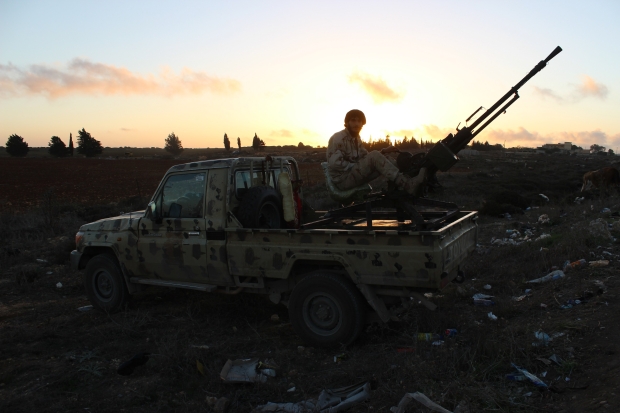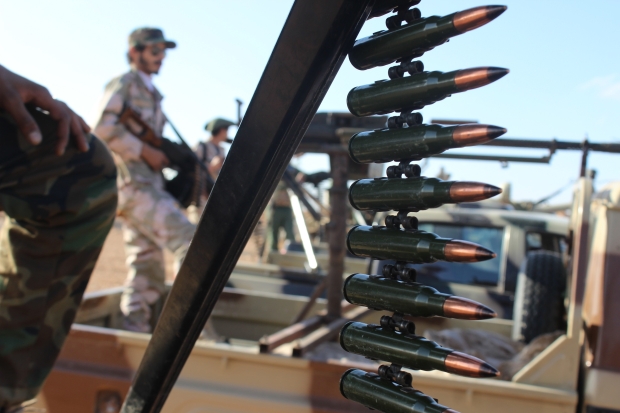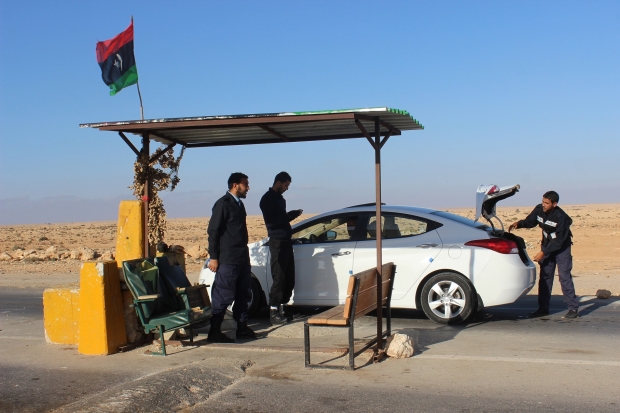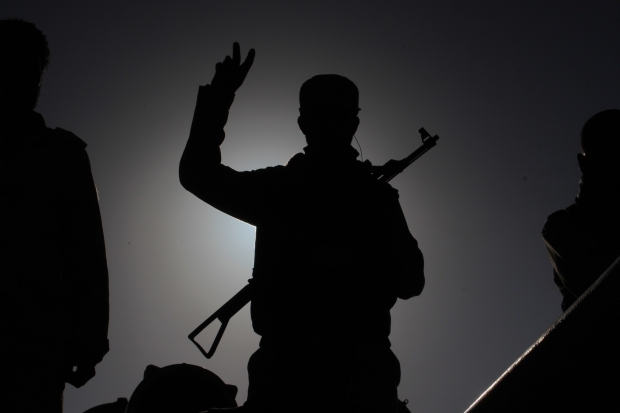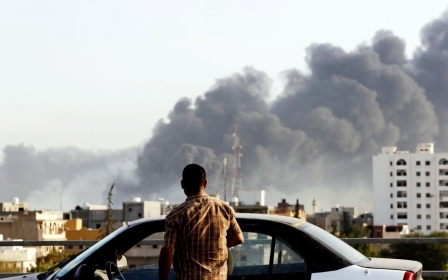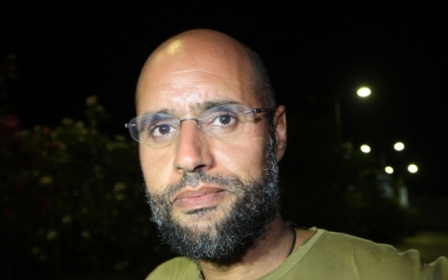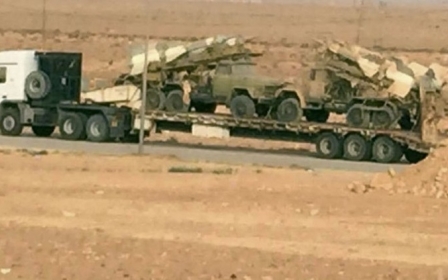Libyan army gears up for Derna assault
AIN MARA, Derna Distric, Libya - Aymen, a 34-year-old soldier in the Libyan army, stood by the checkpoint in disbelief. He never thought that he would get anywhere near the Libyan city of Derna again, but there he was, just 15 kilometres away, standing at a checkpoint where, locals say, many people have been killed and kidnapped by Islamic State-linked militants.
The soldier from eastern Libya entered as part of an army squadron that is slowly building up its presence in the area and is gearing up to launch an offensive against militant groups on the ground. They hope that doing so will help drive out IS and other groups and help firmly turn the tide in Libya’s ongoing civil war.
The current crisis can be traced to Libya’s 2011 revolution against the 42-year leadership of former Libyan leader Muammar Gaddafi. While the uprising was internationally-supported when Gaddafi was toppled, it wasn't only the revolutionaries who were set free, with lawlessness quickly spreading throughout the country.
"We let loose monsters," said Aymen, a member of Libya's army, who also served under Gaddafi but defected and joined rebel forces in 2011.
"Since 2012, I have not been able to even wear my army uniform. If I were to be caught with it on, they'd kill me."
Aymen’s “monsters” are the militants who have controlled the eastern city of Derna since 2012, and who recently swore allegiance to Abu Bakr al-Baghdadi, the leader of the Islamic State (IS). For the last few months, the militants have filmed themselves driving through Derna in a show of power and solidarity with IS.
In October, the Libyan militant group, Majlis Shura Shabab al-Islam, or Islamic Youth Shura Council (MSSI) - went even further and announced that it had claimed territory in the city of Derna as part of the “caliphate” IS wants to build across much of the Middle East and North Africa.
After years at the helm in Derna, however, army forces are now angling to dislodge these groups in a widely-anticipated assault on the coastal town.
Recapturing Derna
In the cool winter air, Aymen stood and looked up at the pitch black road leading from the checkpoint up to Derna.
"This is Islamist land," he said, as he held his rifle firmly in his hands ready for any attack.
Although his battalion would love to claim the city now, Aymen divulged that: "We can't stay, this is just a scouting trip, although we will take it soon."
Aymen explained that he has been waiting for this chance to attack the “Daesh” - the Arabic acronym for IS - for a long time: "I don't want my children, wife and tribe to be scared anymore," he said. "IS has to come to an end."
Ever since the revolution ended in late 2011, al-Qaeda-inspired militant groups like Ansar al-Sharia and more recently the Islamic State have been gathering strength. They have seized control of whole towns and sections of Libya and carried out an array of brutal attacks on the civilian population, rival militias as well as Libyan army units, in 2012 even attacking the US embassy in Benghazi.
In May 2014, Major General, Khalifa Haftar – who was originally seen as a rogue commander but has since joined forces with regular army troops - began an assault against Ansar al-Sharia and other associated forces in eastern Libya. The move got off to a slow start, but when a new parliament the House of Representatives (HoR), was voted in in June, Haftar’s movement gathered momentum.
However, forces allied to militias from Misrata in western Libya then took control of Tripoli, along with large chunks of western Libya. They set up a rival government under the command of the previous parliament, the General National Congress (GNC), leaving Libya effectively split between East and West.
While Haftar labels Ansar al-Sharia and Misratan-led forces as “Islamists” and “terrorists”, the GNC and rival militias accuse Haftar and the HoR of trying to bring back the old guard.
Derna has played a key part in this conflict.
While the town has long had a reputation for encouraging militantism - the US army believes that the coastal city bred more al-Qaeda-inspired volunteers per capita than anywhere else in the Middle East during the Iraq insurgency against American occupying forces in the 2000s – these underlying pressures exploded post-2011.
By 2012, the Libyan state had long lost control of Derna, with various militant groups rising instead and raining a fresh kind of fear down onto the surrounding towns and villages. Few residents have been left untouched by the drive-by shootings, raids and kidnappings that ensued.
One man - who did not want to be named - in Ain Mara, a town west of Derna recalled how the al-Qaeda-inspired forces in 2012 began setting up a checkpoint for a few hours every other day.
"We never knew when the hours would be," he said. "But if you were unlucky enough to run into them, you would be captured."
No one really knew for certain what would happen next if caught. Some said those who were captured were killed on the spot, although the man said that the militants mainly captured young men for recruiting purposes: "They would brainwash them and make them as they are," he said.
One subject on the minds of many is a recently released video of a young militant of Syrian origin who was captured by army forces and who, according to the clip released on local TV, assisted in over 24 assassinations and countless kidnappings.
At the end of a brief confession, the man, who bears a short beard and long scruffy hair, clearly has fear in his eyes.
"I regret what I did, I swear I do," he was seen as saying.
In a conflict growing increasingly bloodier, the confession rings close to home for many.
Ibrahim, Aymen's cousin, who lives in the village wonders out loud whether the alleged militant was behind the murder of some of Ibrahim’s friends, “Being sorry and expressing regret isn't enough,” Ibrahim said. "He should be killed 24 times and only left to rest in peace on the 25th."
Anti-Haftar sentiment
The hatred seems to run equally as strong on the opposing side, with opponents adamant that Haftar is trying to bring back the brutal days of Gadafi, and kill the revolution. A string of recent airstrikes on Tripoli’s Mitiga airport, have only further fuelled suspicions about his intentions and left Libya’s civilians paying the price.
Anwar Sawan, a power-broker from the western city of Misrata that opposes Haftar, told MEE by phone: "They [Haftar and the army] want power, nothing else, and we will continue to fight them until we make sure that doesn't happen."
When Gaddafi was killed in October 2011, his body was laid first in Anwar's garage. "Haftar will lay here too - just as Gaddafi did," Sawan said.
However, Aymen and others like him deny these allegations and say that they cannot possibly be the remnants of Gaddafi’s rule.
"I fought in 2011 just as many other Libyans did," said Aymen who claims that he stayed with the revolutionaries until the day they killed Gaddafi in Sirt (Gaddafi's home town).
"Our only objective is to cleanse Libya of extreme Islamism," he said.
Tribalism rules supreme
The road from Aymen's home town of Guba to Derna was littered with stories of bloodshed and death. For every mile he drives, Aymen can point to a spot where someone was either kidnapped or executed, or where he had personally come close to one of the two.
The misty roads make a perfect hunting ground. "We have to go over hills slowly," said Aymen. "We never know what's on the other side, that's where they [the militants] wait for you.”
With all routes into Derna now being under tribal or army control - not to mention the skies where Haftar reigns supreme - IS-allied or linked forces have continued to find their way through and are still building up strength in the city.
Local tribes largely support the soldiers, with some even bringing food and medical supplies, and others simply assuring the army that there would be no repercussions if the army were to capture or kill any of their "sons" (tribe members), but tribalism is a double-edged sword in Libya.
According to Aymen, many of the IS-associated militants still have tribal and family connections in areas controlled by the army. In some cases, these connections have even provided safe houses to militants, or smuggled them through army checkpoints.
"It doesn't always matter what you believe in Libya - family and tribe come first," said Aymen.
Tribes in East Libya are very closely knit, almost everyone has a friend or family member who is a member of militant groups. Aymen had a cousin who was a member of Ansar al-Sharia who was killed a few months ago.
Aymen says he was relieved – not because he didn't like him - but because he knew that he could not turn down a cousin if he asked for safe passage.
Army advances
In Martooba, a town 22 kilometres east of Derna, children watch behind the gates of their houses as army cars drive past.
"Dad! Dad! Army, army!" one young boy shouted. The thought of an army 4x4 passing through these streets only days earlier would have been impossible, explained Muthafar, the army commander.
The town has been under the control of militants since 2012, and locals have little trust in any outsiders.
"We were attacked a couple of times on the first day," said Muthafar, who explained it wasn't because the people were backing the militia, but because they no longer had faith in any faction.
"We are moving closer [to Derna] everyday," said Muthafar. "We have specialist units scouting the route inside Derna in preparation for our attack.”
"Although we are allowed to move forward, we can't attack Derna until we get the go ahead from up above," said Muthafat.
For now at least that means getting the green light from Major General Sulaiman Mahmoud, a former army leader during Gaddafi’s time who was best known for carrying out widespread and brutal crackdowns on what the leadership branded as Islamist groups.
His involvement remains highly controversial, with Anwar in Misrata explaining that that the general’s role only further validates fears about a Haftar takeover.
Sulaiman Mahmoud got his official approval for the attack on Derna on 6 December, with the HoR placing its seal of approval, although it will likely be some time yet before his forces launch a full blown offensive.
"I think it will take a while, and many on both sides will die," said Aymen. "The Islamists have had three years to get ready and settle into Derna."
With the mountains and the difficult fighting terrain, Aymen doesn't think it will be as clean-cut as some offensives.
"Many see a small town in a valley, [and say] how hard could it be? But It's going to be very hard, [IS] have a massive military power and fear very little,” he said.
This has left many on both sides in limbo, waiting for the next phase of the conflict to unfurl in Derna.
"All we can do now is wait [to attack]," said Aymen.
Until then, they will continue to prepare, searching cars coming from Derna's direction, and scouting IS positions in anticipation of the final drive.
“IS has controlled us for long enough,” Aymen added. “Daesh will not take back our towns.”
New MEE newsletter: Jerusalem Dispatch
Sign up to get the latest insights and analysis on Israel-Palestine, alongside Turkey Unpacked and other MEE newsletters
Middle East Eye delivers independent and unrivalled coverage and analysis of the Middle East, North Africa and beyond. To learn more about republishing this content and the associated fees, please fill out this form. More about MEE can be found here.


